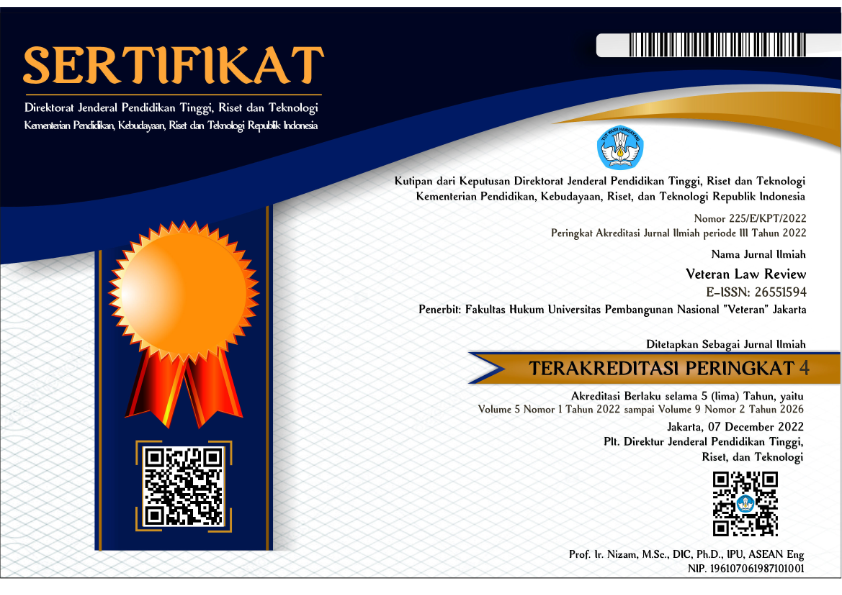Criminal Countermeasures Committed by Women in The Distribution of Narcotics
(Study at Demak Police Station)
DOI:
https://doi.org/10.35586/velrev.v6i2.6382Keywords:
Crime Suppression, Female Suspects, Drug TraffickingAbstract
Based on data from the Demak Detective Police in 2023, it appears that there is a decrease in female suspects who are narcotics cases at the Demak Police Station, indicating that the prevention measures are optimal, but on the other hand it needs to be analyzed whether it has been optimally carried out by law enforcers and whether it is due to the imposition of penalties on users and dealers who are appropriate, or because of special guidance / handling. The research method used is empirical juridical legal research. The results of the research of Demak Police have carried out the right criminal law policy, which includes what actions should be made a criminal offense and what sanctions should be given to the violator. So it can be concluded that law enforcement against narcotics crimes committed by women in the Demak Police jurisdiction, namely First, is to start from preventive measures (preventive) and secondly by repressive means if the preventive method is unsuccessful which is the core of the duties and authority of the police as law enforcers in their capacity as investigators. And there is no difference (all the same) law enforcement between abuse committed by men or women, both dealers, dealers / couriers and users, but the same treatment in terms of investigation. The only difference is when the search of the female body is carried out by the female police.
Downloads
References
References
Journal Articles:
Kifli, Susiana. (2022). "Faktor Penyebab Perempuan Sering Dijadikan Kurir Dalam Transaksi Narkoba." Varia Hukum 31.40
Lestari, I. (2017). Penegakan Hukum Pidana Terhadap Pengguna Narkoba. Jurnal Hukum Khaira Ummah, Vol. 12 No.3.
Mulia, K. F. (2017). “Profil Wanita Penyalahguna Narkoba di Lembaga Pemasyarakatan Kelas II A Pekanbaru”. JOM Fisip, Vol.4 No.2.
Masri, Masri, Niko Pransisco, and Herman Fikri. (2021). "Rehabilitasi Terhadap Pelaku Penyalahgunaan Narkotika di Musi Banyuasin." Disiplin: Majalah Civitas Akademika Sekolah Tinggi Ilmu Hukum sumpah Pemuda
Siregar, Fitri Yanni Dewi. (2020). "Aspek Hukum Penyederhanaan Perizinan Badan Usaha di Bidang Lingkungan Hidup dalam Undang-Undang Cipta Kerja." Jurnal Ilmiah Penegakan Hukum 7.2.
Suprayitno, Putut Hadi. (2018). "Tinjauan Yuridis Penerapan Pemidanaan Terhadap Pelaku Tindak Pidana Penyalahgunaan Narkoba di Kota Mojokerto." ACTUAL 8.2
Tawang, C. M. (2015). “Penegakan Hukum Terhadap Pengedar Narkotika Dengan Berat Netto 36 Gram”. JurnaL Hukum Adigama, Universitas Tarumanagara, 18.
Books with an author:
Arief, Barda Nawawi. 2008, Beberapa Aspek Kebijakan Penegakan Dan Pengembangan Hukum Pidana, Bandung: Citra Aditya Bakti
Hamzah, Andi. 2017 Hukum Pidana Indonesia. Sinar Grafika
Simanungkalit, Parasian. 2011, Globalisasi Peredaran Narkoba Dan Penanggulangannya di Indonesia, Jakarta: Yayasan Wajar Hidup
Tampubolon, Manotar, et al., 2023 Sosiologi Hukum. Padang: Global Eksekutif Teknologi
Hasil Wawancara
Hasil wawancara dengan Kasat Narkoba Polres Demak: AKP Tri Cipto Adi Purnomo, S.H., M.H., pada tanggal 19 Maret 2023
Downloads
Published
How to Cite
Issue
Section
License
Copyright (c) 2023 Veteran Law Review

This work is licensed under a Creative Commons Attribution-ShareAlike 4.0 International License.
Copyright (c) 2022 Veteran Law Review Journal
Veteran Law Review © 2022 by Faculty of Law Universitas Pembangunan Nasional "Veteran" Jakarta is licensed under Creative Commons Attribution 4.0 International

1. License
The non-commercial use of the article will be governed by the Creative Commons Attribution license as currently displayed on Creative Commons Attribution 4.0 International.
2. Author(s)' Warranties
The author warrants that the article is original, written by the stated author(s), has not been published before, contains no unlawful statements, does not infringe the rights of others, is subject to copyright that is vested exclusively in the author, and free of any third party rights, and that any necessary written permissions to quote from other sources have been obtained by the author(s).
3. User/Public Rights
VELREV's spirit is to disseminate articles published are as free as possible. Under the Creative Commons Attribution-ShareAlike 4.0 International License. VELREV permits users to copy, distribute, display, and perform the work for non-commercial purposes only. Users will also need to attribute authors and VELREV to distributing works in the journal and other media of publications.
4. Rights of Authors
Authors retain all their rights to the published works, such as (but not limited to) the following rights;
- Reproduce the work
- Prepare derivative works based upon the work
- Distribute copies of the work
- Perform the work publicly
- Display the work publicly
- Copyright and other proprietary rights relating to the article, such as patent rights,
- The right to self-archive the article,
- The right to enter into separate, additional contractual arrangements for the non-exclusive distribution of the article's published version (e.g., post it to an institutional repository or publish it in a book), with an acknowledgement of its initial publication in this journal (Veteran Law Review).
5. Co-Authorship
If the article was jointly prepared by more than one author, any author submitting the manuscript warrants that he/she has been authorized by all co-authors to be agreed on this copyright and license notice (agreement) on their behalf, and agrees to inform his/her co-authors of the terms of this policy. VELREV will not be held liable for anything that may arise due to the author's internal dispute. VELREV will only communicate with the corresponding author.
6. Royalties
Being an open accessed journal and disseminating articles for free under the Creative Commons license term mentioned, author(s) are aware that VELREV entitles the author(s) to no royalties or other fees.
7. Miscellaneous
VELREV will publish the article (or have it published) in the journal if the article’s editorial process is successfully completed. JOSI's editors may modify the article to a style of punctuation, spelling, capitalization, referencing, and usage that deems appropriate. The author acknowledges that the article may be published so that it will be publicly accessible and such access will be free of charge for the readers as mentioned in point 3.

















